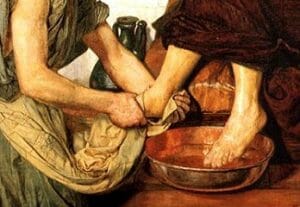A Reflection for Maundy Thursday
A Reflection for Maundy Thursday.

Some of you might just be old enough to remember when Buzz Aldrin and Neil Armstrong landed on the moon in July of 1968.
On the actual day of the moon landing, Buzz Aldrin wrote these word: “We awoke at 5:30 a.m., Houston time. Neil and I separated from Mike Collins in the command module. Our powered descent was right on schedule. With only seconds worth of fuel left, we touched down at 3:30 p.m. Now was the moment for Communion. So, I unstowed the elements in their flight packets. I put them and the Scripture reading on the little table in front of the abort guidance-system computer. Then I called back to Houston. ‘Houston, this is Eagle. This is Lunar Module Pilot speaking. I would like to request a few moments of silence. I would like to invite each person listening in, wherever and whomever he may be, to contemplate for a moment the events of the past few hours and to give thanks in his own individual way.’
“For me, this meant taking Communion. In the blackout I opened the little plastic packages, which contained bread and wine. I poured wine into the chalice my parish had given me. In the one-sixth gravity of the moon, the wine curled slowly and gracefully up the cup. It was interesting to think that the very first liquid ever poured on the moon, and the first food eaten there, were consecrated elements. Just before I partook of the elements I read the words, which I had chosen to indicate our trust that as man probes into space, we are in fact acing in Christ. I sensed especially strongly my unity with our church back home, and with the Church everywhere. I read: ‘I am the vine, you are the branches. Whoever remains in me and I in him, will bear much fruit; for without me you do nothing.”
On this Holy “Maundy” Thursday when we cannot be in our churches due to the Coronavirus it seems even more appropriate to read of those astronauts on the moon re-enacting the Last Supper. Tonight, we can also re-enact the Last Supper in a very deeply spiritual way. Let us ponder the occasion when Jesus gathered with his disciples in that Upper Room in Jerusalem. There Jesus, a day before he died for us on the cross, instituted the Sacrament of the Holy Eucharist. In this Sacrament we receive Jesus Himself under the forms of bread and wine. On this occasion Jesus we also believe he instituted the Sacrament of Holy Orders, that is, he commissioned his apostles to go out and be his apostles among the nations.
Perhaps because of our current lock down and isolation, we might think about Buzz Aldrin and Neil Armstrong in their isolation in space. There were no others on the moon that morning except these two men. Likewise, at the Last Supper there were no other Christians on the face of the earth except for Jesus and his followers. We presuppose that Mary, the Mother of God, and other faith-filled women were there also. Yet from this small grouping would go out the seed of faith to the entire world; these people would literally take the Body and Blood of Christ to all nations.
In the Sacrament of the Holy Eucharist we make a commitment, by the grace of God with us in Jesus, to begin a new life. However, in the Gospel set for this holy day, St John substitutes the foot washing for the words of the institution of the Holy Eucharist. John uses the washing of the feet on two levels, first as a normal part of hospitality. This foot-washing regularly took place upon a person’s arrival for a meal. John says that Jesus actually washes the disciples’ feet “during supper.” Here he is alerting us to a second and deeper level of meaning, yes, foot washing can be seen as a symbolic act, but in the first-century Mediterranean world, different parts of the body were associated with various aspects of the person. The eyes and the heart represented the intellect and judgment; the mouth and ears, communication; and feet, external action, and doing. To wash another’s feet, then, carries the symbolic meaning of forgiveness, of washing away the effect of one’s actions.

John makes Jesus’ message very clear: “I have given you a model to follow, so that as I have done for you, you should do also do.” This instruction is closely tied to the only other command in John’s Gospel: “Love one another. As I have loved you, so you also should love one another” (13:34). Like Jesus, the community of disciples is called upon to love on another “to the end,” and this love requires both forgiveness and humble service.
You and I are the successors of those who gathered in the Upper Room with Jesus. Like them, we are a pretty motely bunch. Many of us, no doubt, come to reflect this day on our own waywardness, our broken promises, our sinfulness. We know that we are weak people. But Jesus said that he came to call the sick and sinners not the fit and virtuous. So, we know that we are always welcome at his table. Perhaps you like many others cannot wait to be back in Church and taking your place at the table of the Lord.
Fr Paul
